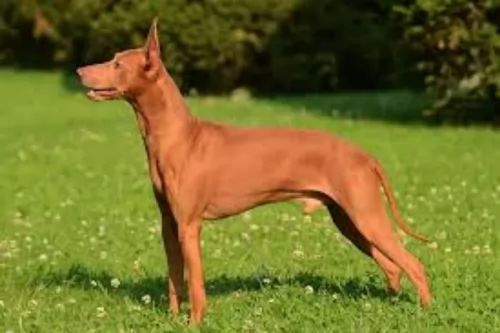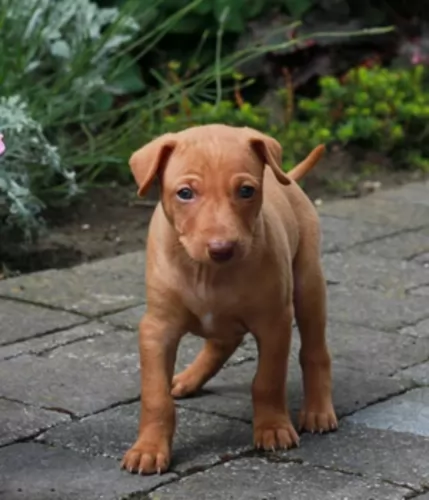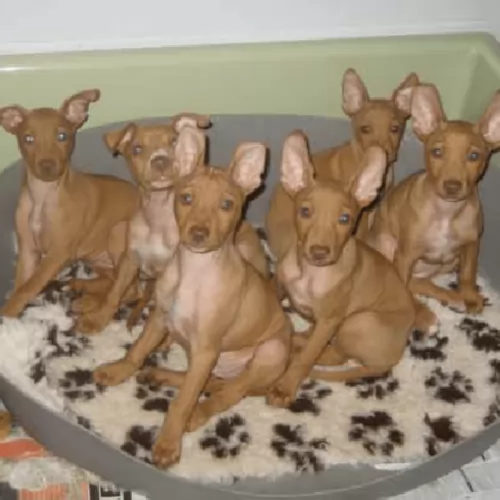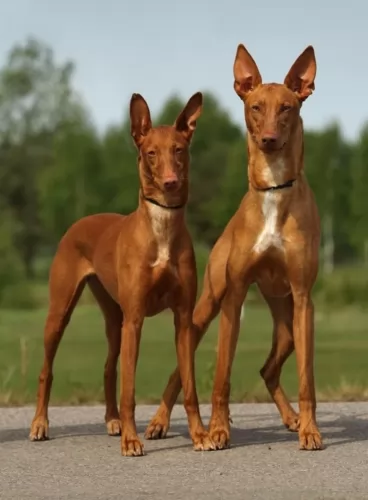 Petzlover
Petzlover Cirneco dell'Etna is originated from Italy but Schnoodle is originated from United States. Cirneco dell'Etna may grow 14 cm / 5 inches shorter than Schnoodle. Cirneco dell'Etna may weigh 33 kg / 72 pounds lesser than Schnoodle. Cirneco dell'Etna may live 3 years less than Schnoodle. Both Cirneco dell'Etna and Schnoodle has same litter size. Both Cirneco dell'Etna and Schnoodle requires Moderate Maintenance.
Cirneco dell'Etna is originated from Italy but Schnoodle is originated from United States. Cirneco dell'Etna may grow 14 cm / 5 inches shorter than Schnoodle. Cirneco dell'Etna may weigh 33 kg / 72 pounds lesser than Schnoodle. Cirneco dell'Etna may live 3 years less than Schnoodle. Both Cirneco dell'Etna and Schnoodle has same litter size. Both Cirneco dell'Etna and Schnoodle requires Moderate Maintenance.
 The Cirneco dell’Etna comes from the island of Sicily and not mainland Italy, although it is considered an Italian dog. It is a small dog that hunted rabbits and its calling card was its ability to go for hours without water or food. They have terrific endurance and a good sense of smell. They were developed for the harsh terrain they worked around places like Mount Etna. Of all the Mediterranean island hunting dogs, the Cirneco de’Etna is the smallest.
The Cirneco dell’Etna comes from the island of Sicily and not mainland Italy, although it is considered an Italian dog. It is a small dog that hunted rabbits and its calling card was its ability to go for hours without water or food. They have terrific endurance and a good sense of smell. They were developed for the harsh terrain they worked around places like Mount Etna. Of all the Mediterranean island hunting dogs, the Cirneco de’Etna is the smallest.
This is a very ancient breed, surviving on its hunting skills alone for thousands of years on Sicily. They then became guard dogs for the peasants. Because they had such speed, sense of smell, alertness and sight, they were great hunters.
Today’s Cirneco de’Etna is highly competitive in confirmation and make terrific pets. They are exceedingly friendly, energetic and low maintenance. Lure coursing is what they really excel at. They are good at agility and pursuit games as well.
 The Schnoodle was developed in the 1980s. It is believed the dog originates from the USA. This was when it was discovered that breeding the poodle with other dogs produced excellent mixes.
The Schnoodle was developed in the 1980s. It is believed the dog originates from the USA. This was when it was discovered that breeding the poodle with other dogs produced excellent mixes.
The idea with the Schnoodle was to develop a low-shedding dog. The Schnoodle is a mix between a Schnauzer and a Poodle,but because both the Poodle ad Schnauzer have different sizes, there is no knowing what size the Schnoodle will be.
Major kennels don’t recognize the Schnoodle as a breed.
 The Cirneco de’Etna is a sleek, muscular sighthound. His ears are close together and high on his head. The head is lean, and the skull is almost flat in profile. The muzzle is about the same length as the skull and the nose is large and its coloring matches the dog’s coat. They have hard pads the same color as their nails, but they are never black.
The Cirneco de’Etna is a sleek, muscular sighthound. His ears are close together and high on his head. The head is lean, and the skull is almost flat in profile. The muzzle is about the same length as the skull and the nose is large and its coloring matches the dog’s coat. They have hard pads the same color as their nails, but they are never black.
 The Schnoodle is a cross between a poodle and a schnauzer and with the poodle parent in the mix, the dog is considered to be hypoallergenic.
The Schnoodle is a cross between a poodle and a schnauzer and with the poodle parent in the mix, the dog is considered to be hypoallergenic.
Because there are three sizes of Schnauzer, the Schnoodle can be medium sized but also fairly large. Weight of this dog can be anything from 6 to 45 Kg and he can stand at between 38cm to 66cm. The coat can be either wavy, straight or curly and will need to be brushed, stripped or clipped according to the coat they have.
The most common coat colors are grey, a mix of grey, silver and white, a fawn or creamish color and black. The medium sized ears are floppy.
Because this is a mixed breed you won’t get a fixed personality type and you won't find fixed looks. Because the dog comes from two excellent parent breeds, you can expect your schnoodle to be friendly, alert and very active.
They may not take readily to kids so it is up to the human owners to see that their children are brought up to be kind and respectful to dogs and animals. Your Schnoodle can be gentle too and stubborn but he will bond closely with his human family.
The smallish size of these dogs makes it a good choice for city or country life, but wherever he is, he will need lots of exercise. Schnoodles are smart and respond well to training.
 Thanks to their parents, Schnauzer cross Poodles are smart, easy to train and fast learners.
Thanks to their parents, Schnauzer cross Poodles are smart, easy to train and fast learners.
Schnoodles are also fun-loving dogs, and they make great playmates for children. They are also a good choice for first time dog owners. A bonus part for dog owners is that these dogs are low shedding, making them great for anyone who suffers from allergies.
The Schnoodle forms strong bonds with their human family and this makes them both protector and watchdog. He is a great family dog with some excellent characteristics from each of the parent dog breeds involved.
 Like many dogs that come from ancient breeds with little cross breeding over the years, there are not a lot of inherited issues for the Cirneco de’Etna. Also, there are so few dogs remaining that little is known about their health in general and there are no studies to go on. Some breeders will do test despite the fact that none are recommended.
Like many dogs that come from ancient breeds with little cross breeding over the years, there are not a lot of inherited issues for the Cirneco de’Etna. Also, there are so few dogs remaining that little is known about their health in general and there are no studies to go on. Some breeders will do test despite the fact that none are recommended.
Their most common health issues are acquired such as injuries from running or competitions and obesity. Both can be controlled by the owner.
 The Schnoodle is a robust, healthy breed, but unfortunately he can also succumb to any one of the many dog illnesses there are -
The Schnoodle is a robust, healthy breed, but unfortunately he can also succumb to any one of the many dog illnesses there are -
This refers to an eye disease which results in the deterioration of the retina. Your dog develops night blindness and this can lead to total blindness. Unfortunately there is no cure.
It can be horrible seeing your pet jerking and twisting out of control with seizures. You will need to get your pet to the vet as epilepsy can be a symptom of a bigger issue.
This is a life threatening disease where your dog’s stomach fills with gas and becomes hard and swollen. The stomach can twist. Symptoms of bloat include restlessness, drooling and trying to vomit.
 The Cirneco needs a good quality food since they are such high energy dogs. Be careful not to overfeed them so that they become obese.
The Cirneco needs a good quality food since they are such high energy dogs. Be careful not to overfeed them so that they become obese.
As previously mentioned, the main concern for owners is injuries acquired while on a running course or in the activities of daily living. They have been known to hurt their feet. They need their ears checked regularly for any signs of infection or irritation. Clean out any excess water or dirt.
This is an intelligent, hardy breed that needs mental and physical stimulation. They need a job, or they can be a major problem. They love hunting of course but also excel at agility, lure crossing, and competition. He is loyal and loves being with people. Take him for long walks but don’t let him off the leash.
 The Schnoodle is a dog that will need a good dose of exercise. Provide him with daily walks, walks in the park, hikes, runs along the beach as well as ball and rope games.
The Schnoodle is a dog that will need a good dose of exercise. Provide him with daily walks, walks in the park, hikes, runs along the beach as well as ball and rope games.
Always try to feed your dog a high quality food. Many people give their dogs one of the commercially manufactured foods there are because they are wonderfully convenient, and you get some good ones.
You don’t want to give this food to your dog day after day after day. Feed him some home-made food occasionally which can be added to his dry kibble twice a week. Boiled chicken, brown rice or pasta and spinach, sweet potatoes and carrots are a healthy choice for your pet.
You can boil it, chop it all up and add smaller portions to the dry kibble twice a week as a wonderful, tasty treat for your dogs.
Try and include some raw meat into the diet as this can help to fight of skin diseases. Ensure there is always a bowl of fresh, cool water for him.
Make sure all the necessary vaccines are up to date to avoid some of the deadly canine diseases there are.